Many writers choose WordPress or Medium to make their writing available on the internet and improve their online presence. But with different strengths, features, and levels of control, deciding which one is right for you can feel overwhelming.
We’ve taken our 14+ years of publishing experience to look closely at these two popular platforms and provide a clear and comprehensive comparison of WordPress vs. Medium.
In this article, we will compare WordPress and Medium with their pros and cons, explore what they are best suited for, and help you discover the best platform for you.
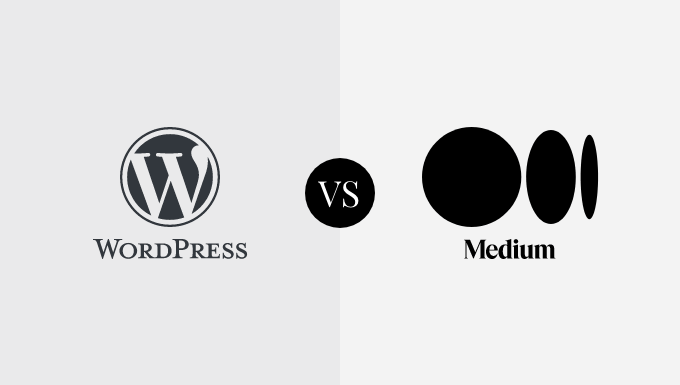
Since we want to create the most detailed WordPress vs. Medium comparison, we have broken down the article into multiple in-depth sections. In each section, we will show which platform offers the most benefits to a beginner:
- Overview of WordPress and Medium
- WordPress vs. Medium: Hosted vs. Self-Hosted
- WordPress vs. Medium: Features & Plugins
- WordPress vs. Medium: Design & Layout
- WordPress vs. Medium: SEO
- WordPress vs. Medium: Support
- WordPress vs. Medium: Monetization Options
- WordPress vs. Medium: Cost
- WordPress vs. Medium: Which Is Better?
- Frequently Asked Questions About WordPress vs. Medium
Overview of WordPress and Medium
Let’s start by taking a look at an overview of what WordPress and Medium offer for bloggers.
What Is WordPress?
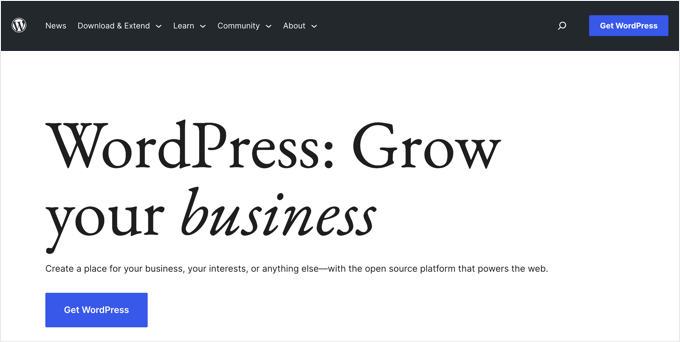
WordPress was launched over 20 years ago and now powers over 43% of sites on the internet.
That makes it the most popular website builder and content management system (CMS) in the world. In fact, it’s used by many of the most successful blogs and websites in the world, including a lot of big-name brands.
When you are getting started with a new WordPress blog, you will need to purchase both a domain name and web hosting. Luckily, there are plenty of great WordPress hosting companies that offer a 1-click WordPress installation and easy blog setup.
Here are some of the pros and cons of using WordPress that we will discover as we compare the two platforms side by side in this article.
Pros:
- The WordPress software is free, open-source, and super easy to use.
- You can use WordPress on your own website and are in full control of your content.
- The WordPress block editor is user-friendly and allows you to add rich content by inserting blocks into your posts.
- You can add more features to your WordPress website using plugins.
- You can customize the look and feel of your WordPress website by installing a theme.
- There are lots of ways you can make money using a WordPress blog, including running your own ads, making affiliate income, and selling products and services.
- You can get detailed analytics about your website using tools like Google Analytics.
- There are powerful SEO plugins available that help you increase traffic to your website.
Cons:
- WordPress requires more setup than Medium, including purchasing web hosting and a domain name. However, this can be quite inexpensive.
- You will need to install the WordPress software, but many hosting providers do this for you automatically.
- You will also need to update and back up the WordPress software. However, this is straightforward, and there are plenty of easy-to-use backup plugins to choose from.
Note that in this article, we are talking about WordPress.org and not the WordPress.com hosting service. For more details, please see our guide on the difference between WordPress.org and WordPress.com.
What Is Medium?
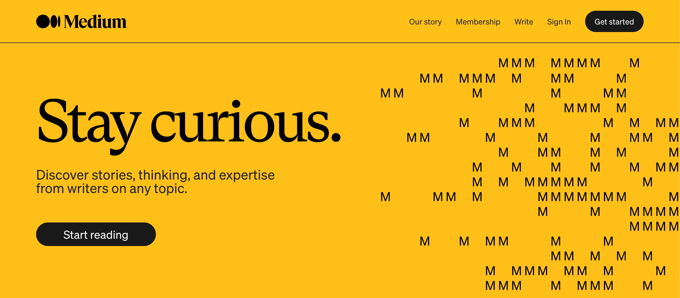
Medium is a popular online publishing platform that was launched in 2012. It allows individuals and organizations to easily create and share written content.
You add your content using a simple web interface. Medium encourages a minimalist approach to content creation, focusing on the text and images rather than complex design elements. This content is then stored on Medium’s own servers.
That means that you just need to sign up for a Medium account and don’t have to pay for additional hosting and a domain name. However, if you would like to use your own domain name, then Medium does offer that option as well.
Here are some of the pros and cons of Medium that we will cover in this article.
Pros:
- You don’t need to install software to use Medium, just sign up for an account.
- The Medium content editor is streamlined and easy to use, offering only the most essential features.
- Backups and security are handled by the Medium team.
Cons:
- Medium has limited features, and you can’t add more using plugins.
- Medium offers only basic layout and customization options.
- Medium will present content by other authors right next to yours.
- There is only one way to make money using Medium, and that is by signing up for their Partner Program.
- Medium membership can be a little more expensive than WordPress, depending on your preferences and needs.
Now that you have a general idea of the pros and cons of WordPress and Medium, we can jump into our full review.
WordPress vs. Medium: Hosted vs. Self-Hosted
WordPress is free software that you can install on your own web hosting account. This means that you own 100% of all your content and have full control over how you promote your brand.
As your site grows in popularity, you alone decide how to grow your content and brand recognition, such as following our tips on how to increase the time users spend on your site.
By contrast, Medium is a completely hosted service. This means that your website lives on their servers, and you have to follow their terms of service. They can decide to shut your website down, announce new pricing plans, or cancel your account at any time.
Plus, when you use Medium, your stories are used to promote their brand, not your own. Content from other authors may be displayed below your own story.
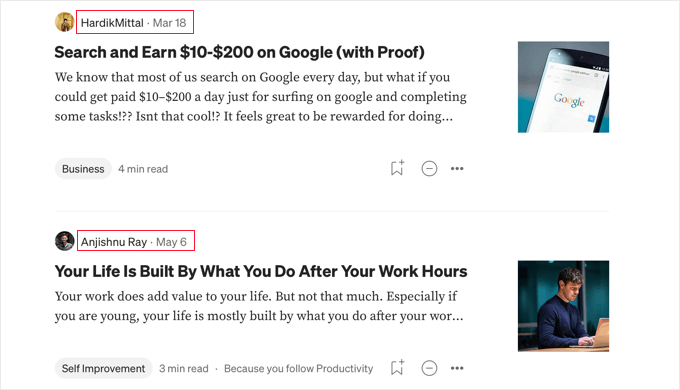
This can take users away from your own content to read articles by other brands and authors.
Winner: WordPress
WordPress vs. Medium: Features & Plugins
WordPress can be used to create just about any type of website you need. You can use it to start a personal blog, small business site, eCommerce site, portfolio, and more.
That’s because it offers a rich ecosystem of plugins. You can think of these as apps that let you add new features to your website, such as contact forms, image galleries, portfolios, interactive popups, and more.
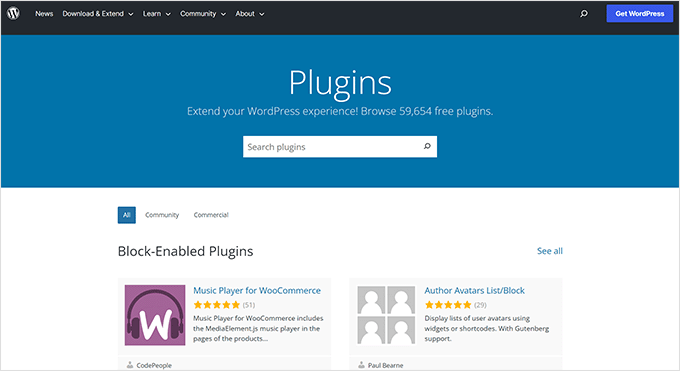
There are around 60,000 free plugins available in the official WordPress plugin directory. Besides that, there are countless other premium plugins available from third-party websites.
Medium is the exact opposite. It is designed with one purpose in mind: to display content on the web with few distractions. Its main feature is a simple editor with basic formatting.
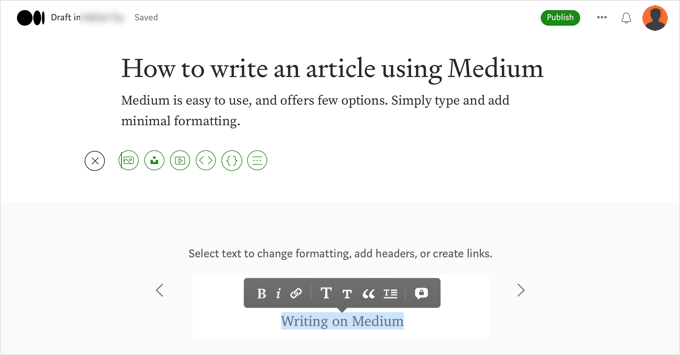
It doesn’t offer any extra features, and you can’t use plugins to add more functionality.
That makes it easy to use if you simply want to publish content on the web. But as your needs grow over time, you may find that you quickly outgrow what Medium offers.
Winner: WordPress
WordPress vs. Medium: Design & Layout
WordPress allows you to customize the look and feel of your website using themes. Themes control the appearance of your website and allow you to create a highly personalized site with unique features.
You can customize your theme using built-in features like the WordPress theme customizer or full site editor.
You can also use a page builder plugin like SeedProd to create landing pages and even custom themes. Page builders usually come with a beginner-friendly drag-and-drop builder, along with professionally designed templates.
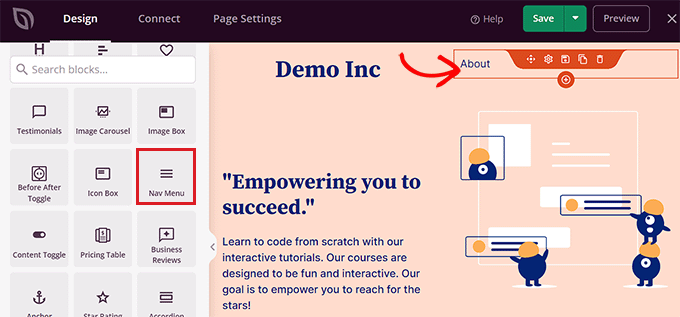
On the other hand, Medium offers a clean and minimalist design that focuses on the content itself. While it doesn’t have the many customization options of WordPress, it provides a consistent and attractive reading experience.
Medium allows you to choose a layout for your publication. You add your own website logo, background color, or image to the header. You can also select a grid or stream-based layout.
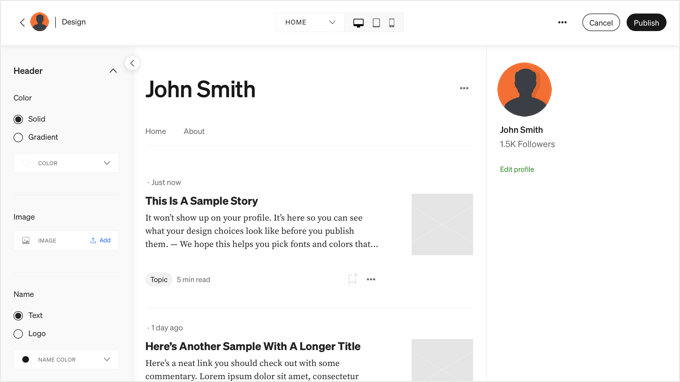
However, your publication’s appearance is still limited to the choices available in Medium. You cannot choose your own design and layout for your publication.
Winner: WordPress
WordPress vs. Medium: SEO
SEO stands for ‘search engine optimization’. Its purpose is to make your content appear higher on search engine results pages so users will find it easily when they do an online search.
If you want to rank high in the search engines and get more website traffic, then you will need to use a search engine-friendly platform.
WordPress is search engine-friendly right out of the box. The core platform is built with SEO best practices in mind, so it’s easy to increase your website traffic and rankings.
For example, you can configure your permalink settings to create SEO-friendly URLs, make categories to organize your content, and much more.
You can further maximize your WordPress SEO by using WordPress SEO plugins and tools.
For example, the All in One SEO plugin lets you fully optimize your site for search engines without hiring an expert. It lets you add SEO titles and meta descriptions, choose a focus keyword, and even provides recommendations on how to optimize your blog posts.
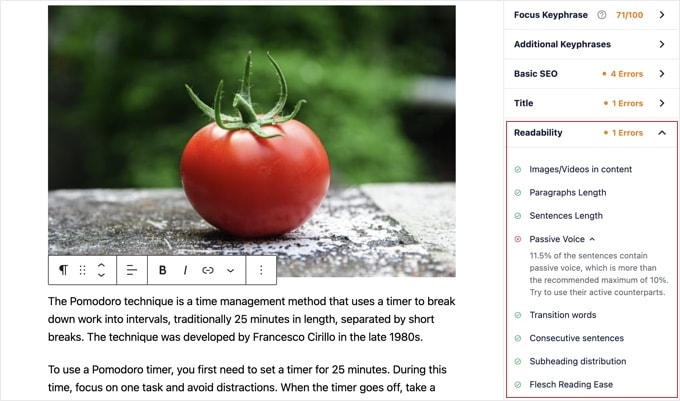
Medium’s approach is different. It already has a built-in audience of users who enjoy reading written content.
Once those writers are on the Medium website, they can discover content they are interested in through topic tags and algorithms.
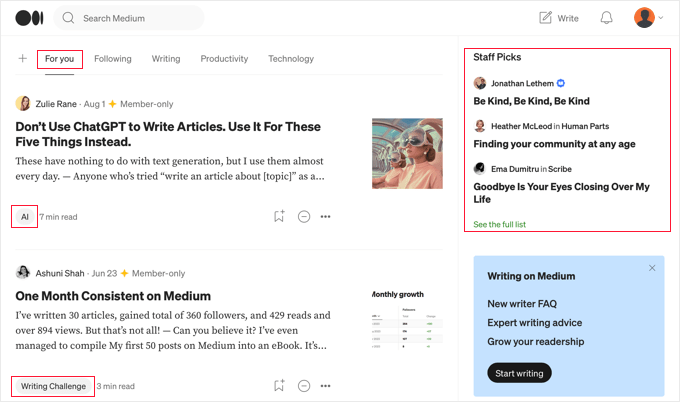
However, the content recommendations these visitors receive are limited to the Medium ecosystem, so they won’t know about the content you have written elsewhere. Also, there is no guarantee that Medium will prioritize your quality content above other authors.
Winner: WordPress
WordPress vs. Medium: Support
Because the WordPress community is so large, there are all kinds of useful, free resources available online. You will usually be able to find answers to all of your WordPress-related questions with a simple Google search.
WordPress.org offers official documentation and support forums where you can find help for many problems. Besides that, at WPBeginner, we have created a large range of free resources.
You can also find help and ask questions on social media platforms, such as our WPBeginner Engage Facebook group.
When you need support for the specific plugins you use, you can visit their dedicated support forums on WordPress.org or their own websites. You can learn more in our guide on how to properly ask for WordPress support and get it.
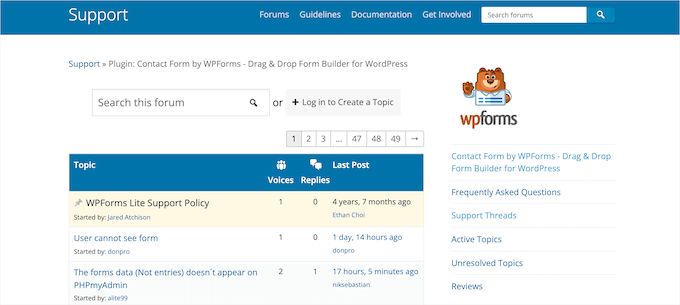
Medium also offers quite a lot of support for its users. You can also use a contact form to reach out to their support team with any specific concerns you have.
They have also created a help center and knowledge base.
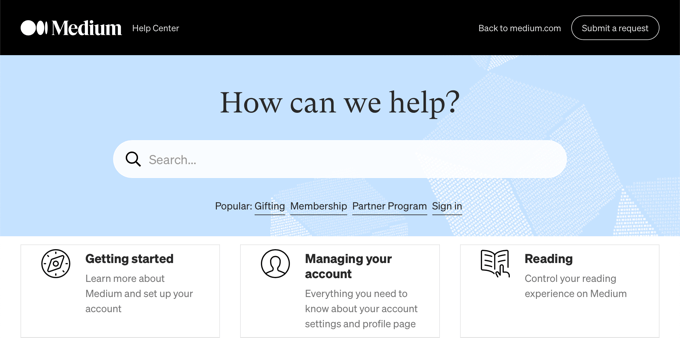
You are much less likely to find help for your Medium-related problems on third-party websites. However, because the platform is so much simpler, you are less likely to run into complex issues than when using WordPress.
Winner: Tie
WordPress vs. Medium: Monetization Options
Because you have complete control over a WordPress website, you can monetize it any way you like without restrictions.
There are plenty of ways you can make money online blogging with WordPress.
For example, you can:
You will need to invest some time and effort, but over time, you can start to earn money online by doing what you love.
On the other hand, Medium only offers one way to make money: their Partner Program. This allows writers to earn money based on engagement metrics like how long members spend reading your articles, positive interactions, and subscription fees paid by readers.
However, it can take quite a lot of time to start making money, and Medium reports that only 6% of partners make over $100 per month.
Winner: WordPress
WordPress vs. Medium: Cost
Cost can be a major factor when deciding on which platform to use for creating a new website. Let’s look at how much it costs to publish your content on a WordPress website vs. Medium and the steps you can take to keep costs as low as possible.
The Cost of a WordPress Website
While the WordPress software is free of charge, you will need to pay for a domain name and web hosting when you create a new website. But how much will this cost?
Typically, you will pay $14.99 per year for a domain name and $7.99 per month for a hosting plan. When you are just starting out, this can add up.
Luckily, you can save money when you choose Bluehost. They are recommended by WordPress.org and have agreed to give our readers a huge discount on hosting and a free domain name.

That means you can get started for as low as $1.99 per month.
Besides that, they also include a free SSL certificate.
If you start out by using free WordPress plugins and themes, then that’s all you will need to pay. Most premium plugins and themes also have free versions with slightly less functionality. As your website grows, you can begin to invest in premium themes or plugins as needed.
If you’d like to see a detailed breakdown of costs, then take a look at our guide to the cost of building a WordPress site.
The Cost of Publishing on Medium
While you can get started writing on Medium with their free plan, you will quickly want to become a Medium member. This costs $5 per month or $50 per year. That’s because the free plan is very limited.
First, there are limits to what you can read using Medium’s free plan. While you can read as many free articles as you want, you are only able to read 3 articles that are behind the Partner Program paywall. And that’s most of the articles on the platform.
Writers on the free plan can write as much content as they want. However, there are several important benefits to becoming a paying member:
- You can make money from your content.
- Your content may be recommended more often by Medium’s algorithms.
- You gain access to more detailed analytics about your content and readers.
- You can use your own domain name.
- You can create a Medium publication, which is a space on Medium where you show content on a specific topic written by yourself or multiple authors.
Winner: WordPress
WordPress vs. Medium: Which Is Better?
Now that you’ve read our comparison of WordPress vs. Medium, you can see that WordPress is a much better option for starting a new blog or website.
It is a more flexible solution than Medium, which is just a fast and simple blogging platform. WordPress offers much better design options and themes, as well as a lot of plugins that allow you to add extra features to your WordPress site.
Plus, it does all of this at a lower monthly price. With WordPress, you remain in complete control over how much you spend when building your new blog.
If you are ready to get started with WordPress, then you can see our complete step-by-step guide on how to create a WordPress website.
If you are a writer who chose Medium when you were starting out because you felt it was easier to set up, then you may be wondering if you can migrate your content to a WordPress blog.
Unfortunately, it can be quite difficult to export your data from Medium in a WordPress-compatible format.
That’s why we developed a Medium to WordPress Importer tool that exports your content from Medium in a file format that is compatible with WordPress.
You can learn how to use it in our guide on how to properly move from Medium to WordPress.
Frequently Asked Questions About WordPress vs. Medium
Do you still have questions about Medium vs. WordPress? Here are answers to some of the questions we are asked most often by our readers.
Which is cheaper, WordPress or Medium?
While the WordPress software is free, you will need to pay for a domain name and hosting. These prices vary between hosting providers, but if you take advantage of our exclusive Bluehost coupon, then you can get started for just $2.75 per month.
While you can start writing on Medium for free, you will be missing out on detailed analytics, the ability to make money from your content, Medium publications, and more. These additional benefits will cost you $5 per month.
So, depending on your needs, you may well find that WordPress is the cheaper option.
Which is easier to use, WordPress or Medium?
Both WordPress and Medium are quite easy to use. Medium has a simpler and more streamlined interface, so it can be easier for beginners to get started with. But this simplicity is only possible because there is less functionality.
WordPress has more features and customization options. This gives it a higher learning curve and makes it more complex for beginners, but it is also more likely to continue to meet your needs as your website grows in the future.
Can I use my own domain name with Medium?
Yes, users who are paying for a Medium membership can use a custom domain or subdomain for their profile page or publication.
Can I migrate my content from Medium to WordPress?
Yes, you can use our Medium to WordPress Importer tool to easily move your Medium content to WordPress.
We have written a step-by-step guide on how to properly move from Medium to WordPress.
We hope this tutorial helped you compare WordPress vs. Medium. You may also want to see our guide on the most common misconceptions about WordPress and our expert pick of the best WordPress drag-and-drop page builders.
If you liked this article, then please subscribe to our YouTube Channel for WordPress video tutorials. You can also find us on Twitter and Facebook.





Moinuddin Waheed
In my personal humble opinion both the platforms medium and WordPress serve different purposes though there are some commonalities between them.
Whereas wordpress can be used for creating any kind of website, making online presence, medium is only for content creation with a simplistic editor with limited control over look and feel.
Having said this, there is no wordpress vs medium but infact it is wordpress and medium as I don’t see any rivalry amongst the two platforms.
Dennis Muthomi
Very SOLID point there
Ok, I agree they serve different goals. But those using Medium may find themselves needing more advanced funtionalities over time that WordPress can provide. But for quick blogging, Medium definitely still wins!
Allan Seabrook
Hello,
Thanks for your article which answers many of my questions on ‘why Medium?’
Perhaps you could also help me to understand why seasoned writers like Jeff Goins would use Medium as well as their personal website blogs, often to post the same articles. I’m puzzled about this.
Thanks!
Hussainart
Well, much of all said here was convincing but the article was definitely biased. Should’ve done a more professional approach in differentiating them. WordPress may not have many Cons, but Medium does have a lot of Pros. Plus it’s new (and gorgeous), may be it will take over the rest? May be not. Hm.
Mainul Kabir Aion
HI there,
Thank you for this awesome post. I was wondering where is the 7th step?
WPBeginner Support
Hey Mainul,
Thank you for notifying us We have fixed it.
We have fixed it.
Admin
Tony B
It’s a no brainer, if you want to leverage YOUR brand it must be on your own piece of interweb.
Full control means full flexibility.
Wordpress is what I’d recommend for most solopreneurs wanting to carve a piece of the pie, be it for hobby or business.
Medium is a ‘nice looking’ platform, but what’s the USP?
Tyler
I guess to me Medium is nothing new. I tried it out and I can’t figure out what all the buzz is about. Plus, they are paying big brands to use their platform to make them seem more successful.
Awontis
We will always recommend WordPress due to the wide spectrum of possibilities with formating text, pictures, and simple usage.
Sergiu Poenaru
Worst case scenario, if Medium falls down, there will be a Syed to create a migration plugin from Medium to WP. Problem solved.